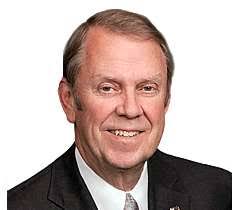
Studio portrait of Sid Salter. (photo by Beth Wynn / © Mississippi State University)
By: Sid Salter
The rather nondescript email from activist Marissa Barrow of the “Progressive Change Campaign Committee” arrived in my email inbox on March 18 with the subject line: “Elizabeth Warren parallels RFK’s 1967 tour of Mississippi Delta.”
Upon opening the email, I was greeted with a series of comparative photographs – some color photos showing Democratic presidential contender and Massachusetts U.S. Sen. Elizabeth Warren visiting with Mississippi Delta residents in Cleveland in 2019 alongside black-and-white photographs of the late U.S. Sen. Bobby Kennedy visiting Delta residents in 1967.
The attempt to compare Warren’s 2019 visit to the Delta with Kennedy’s 1967 visit seems exceedingly shallow and contrived – in a way almost politically and morally blasphemous. First and foremost, comparing the state and nation’s political and social climate in 1967 with that of today is telling.
There was true danger confronting all concerned when Kennedy made his pilgrimage to Mississippi in 1967 to see the poverty he’d heard Senate committee testimony about from activist Marian Wright for himself. Kennedy and those traveling with him risked being targeted for violence in the Mississippi that existed in that era.
Likewise, the impoverished African American Delta families who allowed their homes to be used as backdrops for Kennedy’s visit faced perhaps even more raw danger from drawing attention to Mississippi’s inequalities from white supremacists. When RFK visited the Mississippi Delta, it was considered by many Mississippians as a political provocation rather than a humanitarian mission.
But the fact is that federal government efforts to deal with poverty and hunger in America were still in their practical infancy. Food stamps began as a pilot project in 1961 during the administration of President John F. Kennedy with a dual purpose – to feed the hungry, yes, but also to provide a destination for surplus farm commodities.
At the beginning, the program nationally served less than 150,000 people at a cost of $13.1 million. By 1964, some 425,000 people nationally were served at a cost of just over $30 million.
RFK’s visit indeed did bring a greatly heightened level of national awareness to poverty and hunger in the Mississippi Delta and in the Appalachian South, but by October of 1967 national food stamp use was only at the 2 million mark. Still led in that day primarily by segregationist elected officials, Mississippi was a very reluctant participant in the food stamp program. But by Fiscal Year 2015 in Mississippi alone, food stamps or the Supplemental Nutrition Assistance Program (SNAP) provided about $0.92 billion in food benefits to a monthly average of 636,322 people in Mississippi.
For the latest year of available statistics, an average of 582,658 Mississippians received Supplemental Nutrition Assistance Program (SNAP) benefits or food stamps each month. The U.S. Department of Agriculture estimates that number represented 83.4 percent of those Mississippians eligible to receive those benefits. The SNAP program pumped $810 million into Mississippi’s economy.
Federal dollars make up about 42 percent of all state revenue in Mississippi and federal transfer payment account for 26.3 percent of all personal income in the state. Does Sen. Warren seriously think that in a nation where Social Security and Medicare are already in mortal fiscal danger, the Mississippi Delta’s poverty can be cured by more social programs?
And how to pay for those promised new programs? Warren pitched her “wealth tax” plan – the so-called “net worth” tax. Perhaps nothing about her 2019 visit to Mississippi was more discordant with the Kennedy’s philosophies than that.
Even when touring the poorest region in the poorest state in the union in 1967, Bobby Kennedy was a pro-growth capitalist. Warren’s 2019 tax policy proposals smack of nascent socialism.











